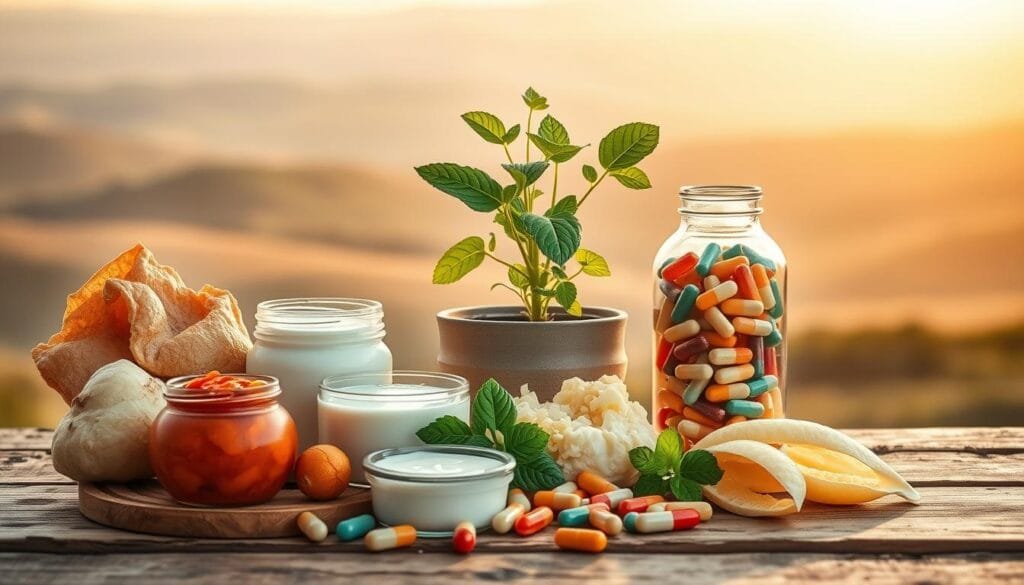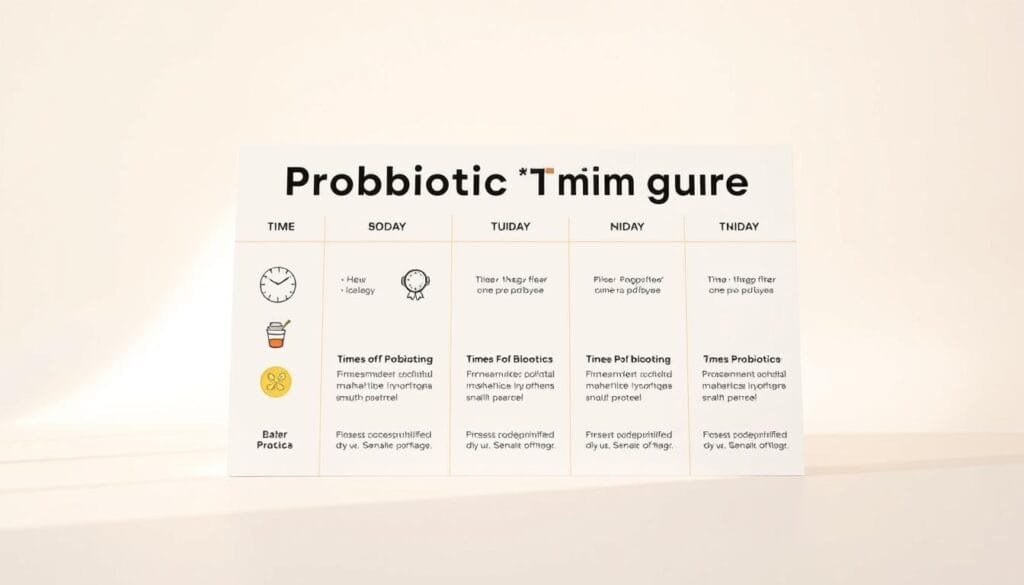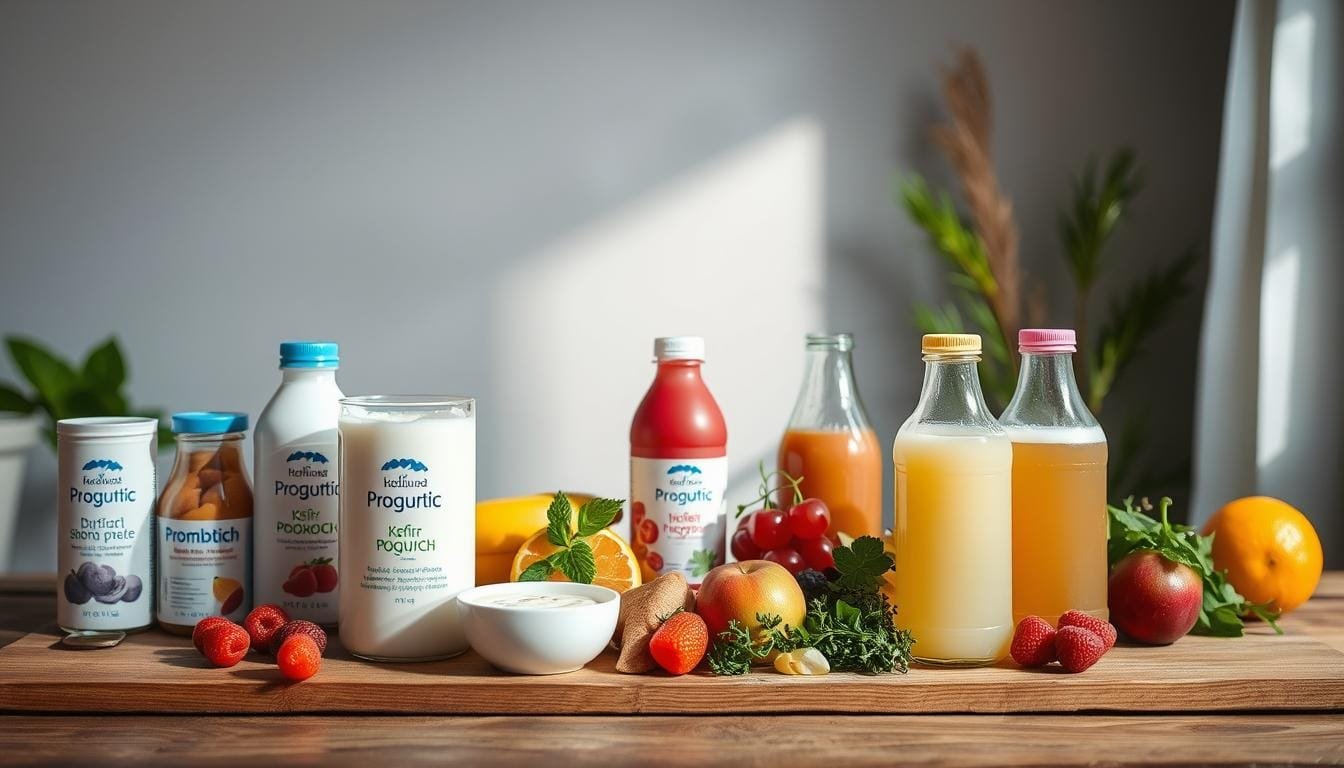Currently Empty: RM0.00
Probiotic supplements have become essential for millions seeking better gut health. These live microorganisms thrive when supported properly but face challenges from everyday habits. Nearly 30% of antibiotic users report digestive discomfort, making proper probiotic care critical for recovery.
Many don’t realize common drinks can neutralize these beneficial cultures. Hot beverages, acidic juices, and alcohol create harsh environments for delicate bacteria. Timing also plays a role – consuming probiotics too close to meals or incompatible liquids reduces their survival rate.
Wellness Concept’s experts emphasize smart pairing strategies. “Protecting your probiotic investment starts with knowing what to avoid,” their advisors note. Clients across Malaysia use personalized guidance via WhatsApp (+60123822655) during business hours to refine their routines.
Research shows proper usage helps maintain microbial balance for improved immunity and digestion. This guide reveals science-backed tips to maximize supplement effectiveness while sidestepping common pitfalls.
Key Takeaways
- Hot drinks can destroy probiotic cultures if consumed too close to supplement intake
- Alcoholic beverages may disrupt gut bacteria balance and reduce absorption
- Acidic liquids create hostile environments for beneficial microorganisms
- Proper timing between supplements and meals enhances bacterial survival
- Consulting health professionals ensures personalized probiotic strategies
Introduction to Probiotic Health and Wellness Concept
Modern wellness practices increasingly recognize the gut as the body’s second brain, influencing everything from energy levels to emotional balance. Probiotics act as nature’s maintenance crew for this vital system, replenishing microbial communities that modern lifestyles often disrupt.
Overview of Probiotics and Digestive Health
These living microorganisms work like microscopic gardeners in the digestive tract, nurturing environments where Lactobacillus and Bifidobacterium can thrive. Research confirms they assist in breaking down food, synthesizing nutrients, and crowding out harmful pathogens. Their presence supports not just digestion but whole-body wellness through the gut-brain axis.
After antibiotic use or periods of stress, the digestive system often needs reinforcements. Beneficial bacteria in quality supplements help restore equilibrium, creating conditions for optimal nutrient absorption and immune response. Wellness Concept’s advisors note: “A balanced gut microbiome forms the foundation for lasting vitality.”
Purpose of the How-To Guide
This resource clarifies how to maximize probiotics’ potential through informed daily choices. It addresses common confusion about timing, food pairings, and lifestyle factors that impact live bacteria survival. Readers gain practical strategies tailored for Malaysian lifestyles, from managing spicy food intake to navigating local beverage customs.
Wellness Concept’s team offers personalized guidance via WhatsApp (+60123822655) during extended operating hours. Their expertise helps individuals transform generic advice into actionable plans that align with personal health goals and cultural preferences.
Understanding Probiotics and Their Role in Gut Health

Probiotics act as nature’s internal caretakers, working silently to maintain microbial harmony in the digestive system. These microscopic allies play multiple roles – from nutrient processing to pathogen control – making them vital for daily wellness.
What Are Probiotics?
Probiotics are live cultures containing specific bacteria strains that support bodily functions. Common varieties like Lactobacillus and Bifidobacterium thrive in the intestinal tract, where they:
- Break down complex carbohydrates
- Produce vitamins like B12 and K
- Neutralize harmful compounds
| Strain Type | Primary Function | Survival Rate |
|---|---|---|
| Lactobacillus | Acid balance | 85% |
| Bifidobacterium | Fiber digestion | 78% |
| Saccharomyces | Infection control | 92% |
Key Benefits for the Digestive System
Regular probiotic use strengthens the gut’s ecosystem. Studies show a 40% reduction in bloating among consistent users. These beneficial bacteria also:
- Enhance mineral absorption by 25%
- Support immune cell production
- Maintain intestinal lining integrity
Wellness Concept’s nutritionists emphasize: “Quality matters – viable strains must survive stomach acid to colonize effectively.” This makes choosing clinically tested supplements crucial for lasting results.
What not to drink while taking probiotics?
Certain beverages can undermine probiotic supplements before they reach the gut. Research reveals that common drinks alter digestive conditions, reducing live cultures’ ability to colonize effectively. Smart beverage choices protect these microscopic allies during their critical journey.
Beverages That Can Harm Probiotic Effectiveness
Alcohol disrupts gut bacteria balance by creating toxic conditions. Regular consumption reduces populations of beneficial strains like Lactobacillus by up to 40%. Acidic drinks lower digestive pH levels, weakening bacterial cell walls before they reach the intestines.
| Beverage Type | Impact on Probiotics | Safer Alternatives |
|---|---|---|
| Alcohol | Kills 55-70% of live cultures | Herbal teas |
| Coffee | Reduces survival rate by 35% | Room-temperature water |
| Citrus juices | Creates acidic barrier | Coconut water |
How Alcohol and Acidic Drinks Impact Live Cultures
Ethanol in alcoholic drinks damages bacterial membranes within 20 minutes of consumption. Acidic beverages like orange juice create hostile environments where only 30% of supplements survive. Heat amplifies these effects – hot toddies or mulled wine deliver double damage through temperature and alcohol content.
Wellness Concept advisors recommend spacing probiotic intake 2-3 hours from problematic drinks. For those managing social commitments, optimal timing strategies help maintain microbial balance without sacrificing lifestyle preferences.
Timing and Best Practices for Taking Probiotics
Precision in probiotic consumption timing doubles their effectiveness. Strategic scheduling helps live cultures survive stomach acids and reach their intestinal destination intact.

Optimal Time of Day for Consumption
Morning routines offer ideal conditions for taking probiotics. Stomach acidity drops after overnight fasting, creating safer passage for bacteria. Wellness Concept advisors suggest:
“Pair supplements with breakfast – the combination of food and lower acid levels boosts survival rates by 60%.”
| Timing Factor | Benefit | Success Rate |
|---|---|---|
| 30 mins pre-meal | Faster intestinal transit | 82% |
| With breakfast | Acid protection | 75% |
| 2hr post-antibiotic | Bacteria preservation | 90% |
Guidelines on Mixing with Other Supplements
Space probiotic and antibiotic doses at least two hours apart. This gap prevents medication from destroying beneficial strains. For multivitamin users:
- Take probiotics first on empty stomach
- Wait 20 minutes before other supplements
- Avoid mixing in hot drinks above 40°C
Temperature control proves crucial. Mixing cultures in lukewarm water (
Integrating Probiotics into a Healthy Lifestyle with Wellness Concept
Adopting probiotics into daily life requires more than just popping a pill—it’s about creating harmony between supplements and lifestyle choices. Wellness Concept helps clients build routines where beneficial bacteria become natural allies in maintaining gut health.
Expert Advice and Recommendations
Consistency transforms occasional probiotic supplements into powerful wellness tools. Taking them at the same time daily helps digestive tract ecosystems expect and utilize these reinforcements effectively. “Think of probiotics as daily teammates, not emergency responders,” suggests a Wellness Concept nutritionist.
Quality matters more than capsule count. Look for products containing Lactobacillus and Bifidobacterium strains with proven survival rates. Pair supplements with foods rich in prebiotics like bananas or oats to feed the new arrivals.
Contact Details and Operating Hours
Wellness Concept’s team tailors strategies for Malaysian lifestyles through WhatsApp consultations at +60123822655. Available Monday-Friday 9:30 am-6:30 pm and weekends 10 am-5 pm, their experts help:
- Design personalized supplement schedules
- Identify local foods that boost probiotic effectiveness
- Adjust routines during travel or stress periods
Regular check-ins ensure balance gut efforts stay aligned with changing needs. Clients receive science-backed advice on maintaining microbial harmony through diet, sleep patterns, and stress management.
Conclusion
Maintaining a thriving gut ecosystem demands careful attention to daily habits. Probiotic supplements deliver powerful benefits when paired with smart lifestyle choices, but their effectiveness hinges on avoiding common mistakes.
This guide highlights how certain beverages create hostile environments for good bacteria. Timing matters too – space antibiotics and probiotics by 2-3 hours to protect live cultures. Consistent daily use helps replenish digestive tract communities effectively.
Choosing quality probiotic products with resilient strains ensures better survival rates. Pair supplements with foods like oats or bananas to nourish both existing and new microorganisms. “Small adjustments create lasting changes,” notes a Wellness Concept advisor.
For personalized guidance, Wellness Concept’s experts are available via WhatsApp (+60123822655) Monday-Friday 9:30 am-6:30 pm and weekends 10 am-5 pm. Their team helps craft routines that align with Malaysian dietary preferences while maximizing gut health results.
FAQ
Can alcohol reduce the effectiveness of probiotics?
Yes. Alcohol disrupts gut bacteria balance and may damage live cultures in probiotic supplements. Limiting or avoiding drinks like beer, wine, and spirits supports better digestive health outcomes.
Are acidic beverages safe to consume with probiotics?
Highly acidic drinks like coffee, citrus juices, or soda can weaken beneficial bacteria. For optimal results, wait 1-2 hours after taking supplements before consuming acidic liquids.
Should probiotics be mixed with hot drinks?
Heat kills live cultures in many probiotic strains. Avoid adding them to hot tea, coffee, or soups. Stick to cool or room-temperature liquids for mixing.
How does antibiotic use affect probiotic intake?
Antibiotics may kill both harmful and beneficial bacteria. Take probiotic supplements 2-3 hours apart from antibiotics to preserve gut flora. Consult a healthcare provider for tailored advice.
What’s the best time to take probiotic supplements?
Morning, on an empty stomach, or 30 minutes before meals enhances absorption. This timing helps live cultures survive stomach acid and reach the digestive tract effectively.
Can sugary drinks harm probiotic strains?
Excess sugar feeds harmful bacteria, counteracting probiotic benefits. Opt for water, herbal teas, or unsweetened alternatives to support immune system and gut health.
Where can I get personalized advice on probiotic use?
Contact Wellness Concept via WhatsApp at +60123822655. Their team operates Mon-Fri 9:30 am–6:30 pm and Sat-Sun 10 am–5 pm for expert recommendations.


